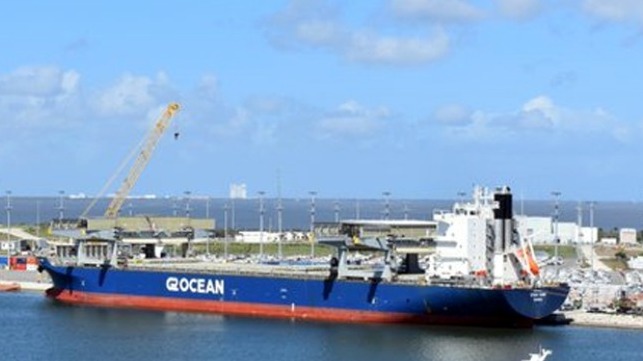Cargo Ship and Container Discovered With Potentially Dangerous Moths

U.S. Customs and Border Protection agriculture specialists reported two incidents of the discovery of highly invasive species of moths on a container and ship arriving in the port of Baltimore, Maryland. Not known to be in the United States, the moths are considered potentially very destructive to trees and plants.
According to CBP, its agriculture specialists discovered the egg mass on the exterior of a shipping container of aluminum billets from India. The USDA entomologist identified the egg mass as Lymantria dispar asiatica/japonica, the highly destructive Asian/Japanese gypsy moth. Asian Gypsy Moth is one of the most destructive insect pests in the world according to the U.S. Department of Agriculture and not known to occur in the United States.
CPB inspectors then discovered egg masses on the general cargo ship the Star Kinn when it arrived in Baltimore from Brazil. The masses were discovered on various parts of the ship including the bridge and mooring station and were sent to the Department of Agriculture for analysis. Using DNA analysis, USDA entomologist identified the egg masses as Paracles azollae, a moth species known to occur in Argentina, and a first local reported discovery of this species in the Maryland area.
Operated by Greig Star, the Star Kinn is a 49,856 ton deadweight general cargo ship. The vessel calls at a range of U.S. ports including Baltimore, Port Canaveral, Florida, and currently is in Beaumont, Texas.
In both instances, the potential dangerous moths were discovered during routine inspections carried out by CBP agriculture specialists. CBP removed the egg masses, treated the container and vessel with a pest spray oil, and submitted specimens to the USDA entomologist for identification.

that matters most
Get the latest maritime news delivered to your inbox daily.
“These invasive pest interceptions illustrate the critical border security role that Customs and Border Protection agriculture specialists perform in safeguarding America’s agricultural and natural resources every day,” said Casey Durst, CBP’s Director of Field Operations in Baltimore. “CBP agriculture specialists will continue to mitigate potential threats, from destructive insect pests to highly pathogenic plant and animal diseases, which could significantly impact our nation’s economic vitality.”
According to CPB, during a typical day last year, nationwide its agriculture specialists seized 4,695 prohibited plant, meat, animal byproduct, and soil, and intercepted 314 insect pests at U.S. ports of entry.
